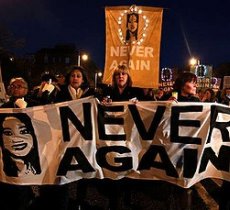W
hile the US battles for equal marriage options in a fight for civil rights, Ireland is still battling for the separation of church and state. Let's all breathe a collective sigh of relief that crazy religious nutjobs don't run our country (insert female voice dripping with sarcasm here).
For anyone unaware of what's happening across the pond; an Indian woman, Savita Halappanavar, died in an Irish hospital on Sunday, October 28th, 2012. Savita was 17 weeks pregnant when admitted to a hospital in Galway and diagnosed with an imminent miscarriage. Savita was denied what many have considered a life-saving abortion on three separate occasions and died shortly after the fetus. Since the news of her death broke, an intense abortion debate has rekindled across the overwhelmingly Catholic nation.
| | | You've got to understand, folks, Ireland's abortion law dates back to 1861, a time when Ireland was still ruled by the United Kingdom (which, ironically, has been performing abortions on demand since 1967). In 1983 an amendment passed making abortions illegal in all cases. There has been only one exception made since that time when, in 1992, a 14-year-old girl known only as 'X' was granted a legal abortion in Ireland after being raped and impregnated by a neighbor. 'X' was only granted this secession due to legitimate threats of suicide. It should be noted that 'X' never actually received the abortion; she miscarried during the court case. |
Ireland stands by its 1992 law; no abortions unless the mother's life is
obviously threatened by continuing the pregnancy. That's a tricky skill for doctors; knowing if a fetus will kill its mother. So, by their own anonymous admissions, many doctors practicing in Ireland refuse to practice abortions on any women, for fear of being dragged to court for murder charges.
Back to the now: The doctors tell Savita and her husband on October 21st that the fetus would, without a doubt, die. For those of you who don't know; miscarriages are very uncomfortable.
The fetus inside Savita didn't die for another
six days. Six days of the most intense internal pain imaginable. When asking to induce labor Savita was told that an abortion was illegal so long as the fetus (albeit a dying one) had a heartbeat, and that Ireland is a Catholic country. She responded with, "I am neither Irish nor Catholic" but there was, apparently, nothing the hospital could do. The fetus dies on October 27th and is surgically removed. Savita is then treated for blood poisoning. She dies the next day.
Here's the ironic part: the word
catholic, when defined by Dictionary.com and Merriam-Webster.com, means "broad in sympathies, tastes or interests." The terms "broad-minded" and "universal" were also used. I always found it funny that the Catholic Church, renowned for torture, brutality, the gravest and most famous political hypocrisies and even child rape, was defined as universal, of all things.
In Ireland, where 80% of the population is Catholic, we see a woman die, quite possibly by being refused an abortion. We don't know for certain that Savita would have survived had she been granted one. However, if the Catholic Church is so broad-minded and universally accepting then you would think, just maybe, their government would acknowledge a non-Catholic's request for a non-Catholic procedure. It's not like this woman was attempting to destroy the Catholic Church with her plea. She was trying to live long enough to maybe have a successful pregnancy.
Ireland wants to make abortions illegal for Catholic citizens? Fine. Whatever floats your island. But it seems to me, on the most basic Catholic level, that no morally righteous Catholic government could refuse a non-Catholic the right to participate in non-Catholic activities. If that is the case, then Ireland should ban all non-Catholic citizenship or visas. Make all Catholic sins into crimes punishable by law. Go all Vatican City on us.
All sarcasm aside, forcing Catholic ideals on your citizens is illogical based directly on the definition of the word 'catholic'. Ireland's government is defeating the purpose of its church.
I am grateful to live in the States, where I only have Catholic ideals forced on me at holidays.


